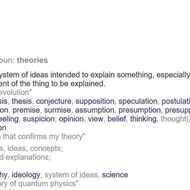What do people think of the theory that the universe is a living thing?
Enjoy being online again!
Welcome to the community of good people who base their values on evidence and appreciate civil discourse - the social network you will enjoy.Create your free account
18 comments
Feel free to reply to any comment by clicking the "Reply" button.With these type of questions we should clarify first the meaning of living thing as most people’s point of reference is that a living thing is a carbon based lifeform or something similar with similar capabilities. Science has not defined anything non-carbon based as living nor have we met or know one. If science does not provide boundaries for definitions then any idea is possible which is harmful for humanity. Consider men having sex with cars (it’s a sexual fantasy mental state) via the car’s gas exhaust which is harmful to the man. If we consider all unproven things it would be the detriment of humanity.
Will future thinking robots be considered living things?
Is a dead body still a living thing because of the live bacteria inside it?
Interesting question … Would you consider a car a living thing just because of the people inside?
No...that would be patently ridiculous.
Never considered it - But I do like the Gaia theory, that the earth reacts to stimuli to maintain balance - on the long time scale
In a way it is a logical extrapolation of the Gaia theory.
Is it not actually a fact, not just a theory?
The word "theory" is a much maligned and misunderstood word. In the majority of cases when people dismiss or use the word theory, they really mean hypothesis. A hypothesis is an unproven explanation that is in the process of being taken through the scientifc process to determine its validity.
In the hard sciences, a theory is equivalent to a scientific fact with the caveat that scientific knowledge is dynamic and can be modified as technoligy becones more precise and allow for increased precision and accuracy.
In the hard sciences a hypothesis does not become a theory until it has been offered up for independent verification by peers, has been subsequently tested and verified through experimentation multiple times.
Consequently as a result of the experimentation there are thousands, if not millions of data points of data that point to the results as the best explanation for the phenomenon.
Therefore, to offhandedly dismiss a theory as "just a theory" is to suggest an inaccurate understanding of the scientific process. Theories are not assigned this designatory in the hard sciences lightly. Behavioral Sciences are less discrimenating with the terminolgy.
I offer up my credentials for this discussion as I have degrees in both fields and have taught Science for 30 years.
@t1nick I actually do know that, but was using the more widely (if incorrectly) held definition of “theory”.
@t1nick theory /ˈθɪəri/ noun
a supposition or a system of ideas intended to explain something, especially one based on general principles independent of the thing to be explained.
"Darwin's theory of evolution"
synonyms:
hypothesis, thesis, conjecture, supposition, speculation, postulation, postulate, proposition, premise, surmise, assumption, presumption, presupposition, notion, guess, hunch, feeling, suspicion; opinion, view, belief, thinking, thought(s), judgement, contention
That definition is too general and does not take into its relationship to the scientific process. In the hard sciences; physics and chemistry, the definition is as I stated above. Your definition is the lay definition and is wrong in its generalization. The word theory is used inappropriately about 95% of the time. Its used when what is meant is hypothesis.
@PontifexMarximus This was the more common definition to which I referred.
Enjoy being online again!
Welcome to the community of good people who base their values on evidence and appreciate civil discourse - the social network you will enjoy.Create your free account
Share this post
Categories
Agnostic does not evaluate or guarantee the accuracy of any content. Read full disclaimer.








